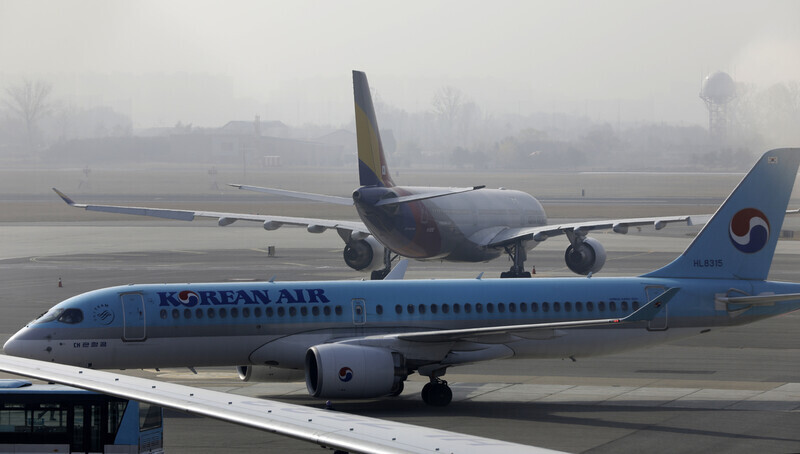hankyoreh
Links to other country sites 다른 나라 사이트 링크
Korean Air clears EU antitrust hurdle in merger with Asiana

The merger between Korean Air and Asiana Airlines is in its ninth inning. The antitrust authority of the European Union conditionally approved Korean Air’s acquisition of Asiana Airlines. Although the merger still has to be approved by US authorities, the EU was considered by many to be the merger’s major stumbling block.
With EU approval, the merger could allow Korean Air to become one of the world’s top 10 mega carriers. Yet because the approval requires the divestment of Asiana’s global cargo freighter business and key routes, there are still questions surrounding the outcomes of the slated merger.
On Tuesday, the European Commission announced that it had “approved, under the EU Merger Regulation, the proposed acquisition of Asiana Airlines (Asiana) Inc. by Korean Air Lines Co., Ltd (Korean Air).” After reviewing the merger back in May of last year, the commission requested revisions to the acquisition, citing concerns over the potential monopoly of cargo and freighter units as well as apprehensions regarding a monopoly over certain routes to European cities.
Korean Air responded by offering to sell Asiana’s cargo unit and to forfeit redundant routes that both airlines operated to Paris, Frankfurt, Rome and Barcelona by offering slots and traffic rights to a low-cost carrier. The revised merger was then submitted to the European Commission in November 2023. There are reports of Jeju Air showing interest in acquiring Asiana’s cargo unit. T’Way is seen as the likely candidate to acquire the four European routes.
EU approval was widely considered to be the biggest hurdle to the merger. The EU is known for being more particular than other countries when it comes to antitrust issues. With the EU’s approval, the merger has now passed 13 of the 14 mandatory evaluations by regulators before becoming official. The Japan Fair Trade Commission approved the merger this past Jan. 31. US approval is the only remaining barrier. Considering the merger’s approval by the EU, most industry observers aren’t forecasting any difficulties in securing US approval.
If the acquisition is successful, Asiana Airlines, founded in 1988, will conclude its 36-year history. The merger will mark the end of an era, where the two giants of Korean Air and Asiana Airlines dominated the Korean carrier industry. The next era will be Korean Air essentially exercising a domestic monopoly. This is why many observers expect Korean Air to grow into a top 10 global carrier.
According to the prospectuses and quarterly reports of Korean Air and Asiana Airlines, the two airlines managed respective fleets of 156 and 79 aircraft as of the third quarter of 2023. If the merger is successful, Korean Air will command 235 aircraft. This nearly rivals that of Air France, one of Europe’s largest airlines, which commands a fleet of 255.
Yet the divestment of Asiana’s cargo unit and the forfeit of four key European routes are a critical point that call into question the profitability and synergy of the merger, considering Korean Air tried to sell the acquisition as a “normalizing Asiana’s operations.”
“The key element to any merger is synergy. I honestly don’t know why they [Korean Air] is trying to go through with the acquisition if they have to give up the cargo business and key European routes,” said an insider in the carrier industry.
“Instead of 1+1 = 2, this merger feels more like 1+1=1. Even if the merger is successful, it’s still going to take plenty of flak,” the industry insider added.
By Kim Kyung-wook, staff reporter
Please direct questions or comments to [english@hani.co.kr]

Editorial・opinion
![[Column] Season 2 of special prosecutor probe may be coming to Korea soon [Column] Season 2 of special prosecutor probe may be coming to Korea soon](https://flexible.img.hani.co.kr/flexible/normal/500/300/imgdb/original/2024/0426/3317141030699447.jpg) [Column] Season 2 of special prosecutor probe may be coming to Korea soon
[Column] Season 2 of special prosecutor probe may be coming to Korea soon![[Column] Park Geun-hye déjà vu in Yoon Suk-yeol [Column] Park Geun-hye déjà vu in Yoon Suk-yeol](https://flexible.img.hani.co.kr/flexible/normal/500/300/imgdb/original/2024/0424/651713945113788.jpg) [Column] Park Geun-hye déjà vu in Yoon Suk-yeol
[Column] Park Geun-hye déjà vu in Yoon Suk-yeol- [Editorial] New weight of N. Korea’s nuclear threats makes dialogue all the more urgent
- [Guest essay] The real reason Korea’s new right wants to dub Rhee a founding father
- [Column] ‘Choson’: Is it time we start referring to N. Korea in its own terms?
- [Editorial] Japan’s rewriting of history with Korea has gone too far
- [Column] The president’s questionable capacity for dialogue
- [Column] Are chaebol firms just pizza pies for families to divvy up as they please?
- [Column] Has Korea, too, crossed the Rubicon on China?
- [Correspondent’s column] In Japan’s alliance with US, echoes of its past alliances with UK
Most viewed articles
- 1‘We must say no’: Seoul defense chief on Korean, USFK involvement in hypothetical Taiwan crisis
- 2Division commander ordered troops to enter raging flood waters before Marine died, survivor says
- 3Is Japan about to snatch control of Line messenger from Korea’s Naver?
- 4[Column] Season 2 of special prosecutor probe may be coming to Korea soon
- 5[Editorial] Korea’s surprise Q1 growth requires objective assessment, not blind fanfare
- 6[Special report- Part III] Curses, verbal abuse, and impossible quotas
- 7Flying “new right” flag, Korea’s Yoon Suk-yeol charges toward ideological rule
- 8[Column] ‘Choson’: Is it time we start referring to N. Korea in its own terms?
- 9[Column] Park Geun-hye déjà vu in Yoon Suk-yeol
- 10Why Korea shouldn’t welcome Japan’s newly beefed up defense cooperation with US